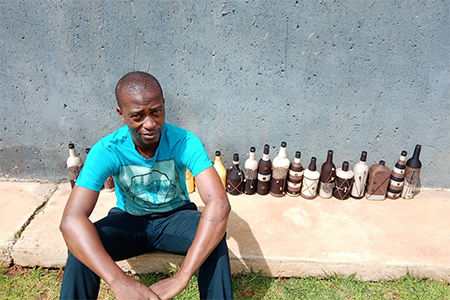Daniel Monyamane describes himself as an assistant librarian by day and an artist all the time in between.
The 36-year-old father of three hails from Koppies, a small town in the Free State, and is a self-taught trash artist who sees beauty and value where most of us see garbage.
Daniel, who works on the North-West University’s (NWU’s) Vanderbijlpark Campus, gives new life to discarded materials, and mostly bottles, by turning them into works of amazing décor artefacts by covering them with wool.
Daniel’s show-stopping pieces are detailed in colour, application and content, and each of his pieces begs for another close-up look.
A long-time passion
His passion for art started at a very young age when he used to draw a lot. However, as he grew older he lost interest. He says his interest in making artefacts was triggered after watching a video of a trash artist on YouTube.
“I always had a vision of making décor art but I did not know where to start. When I watched one video of a person who was making gorgeous things out of discarded materials, I decided to try making stuff out of discarded bottles,” he recalls.
He says it was the positive feedback he received about his creations that encouraged him.
“People were very pleased with my work. My confidence increased when my boss bought my first creations and asked me to make more. I have since been making different things for different clients, and I also supply a furniture store in Vanderbijlpark. I dream of being a go-to person for corporate gifts,” he says.
David cites globally acclaimed artist, Dr Esther Mahlangu, who is known for her bold large-scale contemporary paintings that reference her Ndebele heritage, as his role model.
Combining his artistic passion with a commitment to environmental issues, Daniel gets his materials from dumpsites, roadsides, and household and rubbish bins. He pays a team of homeless people to raid bins for his project supplies.
“I find inspiration from ideas and events, and the eventual form it will take depends on the pieces of trash I find. I mostly weave the wool on the bottles to create different looks. I love playing with colour and I enjoy the inventiveness that is needed to transform trash into something beautiful. Making beautiful pieces out of nothing is the most fulfilling part of it all.”
For Daniel art is not so much about making money, but more about how it makes him feel. He says it is his therapy after a five-day, eight-hour-shift work week.
“I make these things partly because it's fun and entertaining, but also because it makes me feel calmer and more relaxed. It clears my head and helps me to make sense of my emotions. We live in an overwhelming world, and art can be the perfect medium to calm people down.”
However, his hobby has initially rubbed others the wrong way.
When he started collecting bottles and other used material, it used to drive his neighbours and family crazy. Fortunately, once people in his neighbourhood found out what he did, they started leaving bags of their unwanted junk on his doorstep.
Daniel says his long-term dream is to share his artistic skill to his children and other people.
“I dream of starting an art gallery and an art school for young people in my neighbourhood; something that will engage their creative minds. I want a place that will embrace different kinds of visual art, including drawing, painting, collaging, sculpting clay, knitting and scrapbooking.
“I want to teach young kids that they can make beautiful things out of household waste. This will not only help to address the amount of waste people produce, but will also encourage creativity and keep young people off the streets.”
He believes that creating art can teach people to be more responsible. “Art is about making decisions – what kind of utensil to use, which colours, and so on. This is another way of making young people engaged and responsible. Just imagine the impact art could make in our township that is riddled with drug addiction.”

NWU assistant librarian Daniel Monyamane turns trash into treasure.
